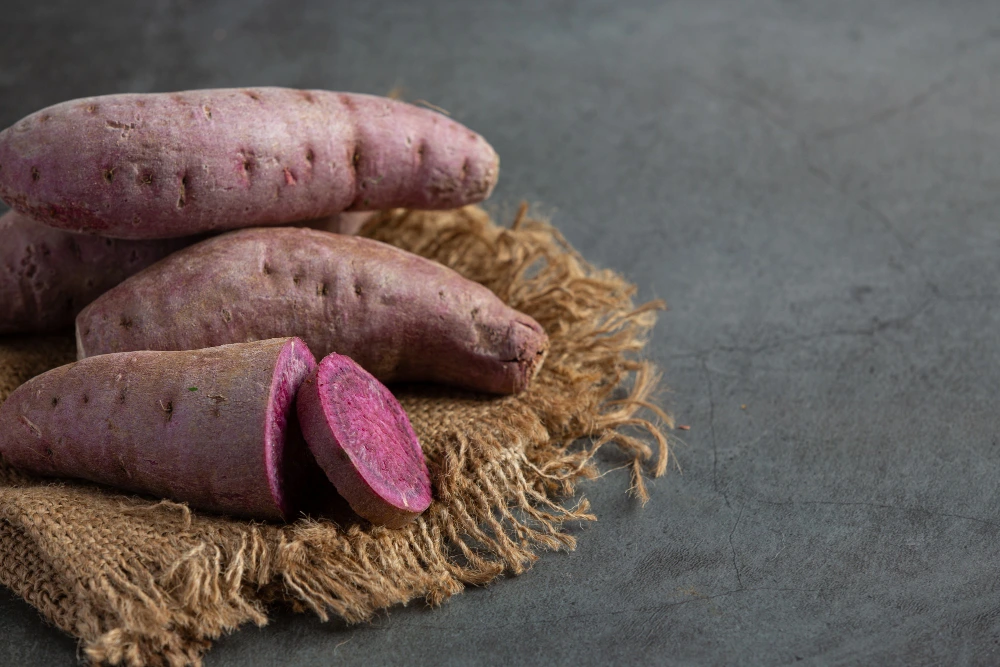
Sweet potatoes are not just tasty but also packed with good stuff like vitamins and fiber. But if you or someone you know has diabetes, you might have heard that it’s important to watch what you eat, especially when it comes to foods that affect your blood sugar.
However, sweet potato is one of the most nutrient-dense tropical and subtropical veggies. Recent studies have highlighted their potential benefits, and they have been utilized in traditional medicine to manage type 2 diabetes. In today’s blog, we will discover if diabetic people can eat sweet potatoes.
Nutritional Value of Sweet Potato
Sweet potatoes are a nutritional powerhouse, offering a high level of vitamin A for healthy vision and skin, moderate amounts of vitamin C for immune support, and a substantial dose of dietary fiber for digestion and a feeling of fullness. The presence of resistant Starch, especially in purple varieties, can be beneficial for blood sugar levels. Here are some of the nutritional contents of sweet potatoes:
|
Nutrient
|
Amount per 100g
|
|
Vitamin A
|
High
|
|
Vitamin C
|
Moderate
|
|
Dietary Fiber
|
High
|
|
Resistant Starch
|
Varies (higher in purple varieties)
|
|
Potassium
|
Moderate
|
|
Manganese
|
Moderate
|
Is Sweet Potato Good for Diabetes Patients?
Can a diabetic eat sweet potatoes? A study suggests that sweet potatoes are great for people with diabetes because they have a low GI (Glycemic Index). High-GI foods can make blood sugar go up quickly and aren’t good for those with type 2 diabetes. Sweet potatoes also have beta-carotene, which gives them an orange color and is full of vitamin A.
They’re a good source of vitamin C, which can boost your immune system, and they have a lot of iron, which helps red blood cells carry oxygen and nutrients in your body. Sweet potatoes even give you plant-based protein, which makes you feel full and can help with weight loss. Plus, the fiber in sweet potatoes is excellent for your digestion.
So, sweet potatoes are like a superfood because of all these benefits. They’re full of vitamins A and C, which can reduce inflammation. But remember, it’s still important to watch how much you eat, especially if you have diabetes.
What are the Suggested Portions for Sweet Potatoes for diabetics?
Sweet potatoes can be a good part of a diet for people with diabetes, but it’s essential to be careful about how much you eat. Since they have natural sugars, eating too many can increase your blood sugar. A good rule is to have about half a cup of roasted or boiled sweet potatoes two times a week.
Are there any Risks for Diabetics Eating Sweet Potatoes?
Following are the few possible risks associated with sweet potatoes:
-
Eating large portions of sweet potatoes may increase blood sugar levels.
-
Unhealthy cooking methods, such as frying or adding sugary toppings, can increase the glycemic impact.
-
Monitoring total carbohydrate intake, including sweet potatoes, is crucial for managing blood sugar.
Always make sure that focusing too much on one food item, even a healthy one like sweet potatoes, without considering a balanced meal plan can be problematic for diabetics.
Sweet Potatoes Cooking Ideas for Diabetes-Friendly Snacks
Are sweet potatoes good for diabetics? It keeps your blood sugar steady, it’s best to cook sweet potatoes like this:
1. Boiled sweet Potatoes
Boiling sweet potatoes is one of the best ways to cook them if you have diabetes. It keeps their glycemic index low, so your blood sugar won’t increase quickly after eating them. To boil sweet potatoes, Peel and cut them into pieces, and boil them until they’re soft but not too mushy.
2. Steamed Sweet Potatoes
Steaming sweet potatoes is another great way to cook them. It keeps their high nutrition and low glycemic index intact. To do it, peel the sweet potatoes, slice them, and then steam them until they’re soft.
3. Steer clear of fried sweet potatoes
Whether deep-fried in oil or as chips, frying sweet potatoes can dramatically raise their glycemic index. If you have diabetes, avoiding fried sweet potato recipes is better.
4. Baked Sweet Potatoes
In contrast to boiling or steaming, baking sweet potatoes might increase their glycemic index, so keep that in mind if you love the flavor. You can lessen this effect by baking them for a longer period at a lower temperature.
What are the Benefits of Sweet Potatoes?
Sweet potatoes have numerous vitamins, minerals, and antioxidants that benefit your general health. The following vitamins and minerals are abundant in them:
Vitamin A is crucial for good vision, especially in low light. It forms pigments in the retina, sending visual info to the brain. Dietary fiber helps you feel full, aids digestion, and prevents constipation. Vitamin C reduces inflammation, beneficial for those with diabetes and high blood pressure. Purple sweet potatoes, with resistant Starch, don’t spike blood sugar much.
Can Type 2 Diabetes Be Treated with Sweet Potatoes?
Although sweet potatoes may help regulate blood sugar, it’s crucial to learn that they shouldn’t be used as a stand-alone treatment for type 2 diabetes. A balanced diet, frequent exercise, medication (if recommended), and blood sugar monitoring are all important components of diabetes care.
Conclusion
If sweet potatoes are prepared properly and consumed in moderation, they can be a beneficial addition to the diet of people with diabetes. To develop a customized diabetes treatment plan that suits your unique requirements and preferences, you must speak with a medical practitioner or a qualified dietitian.
Credit : Source Post






